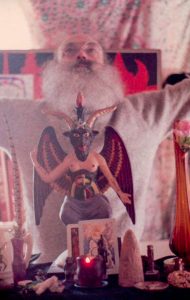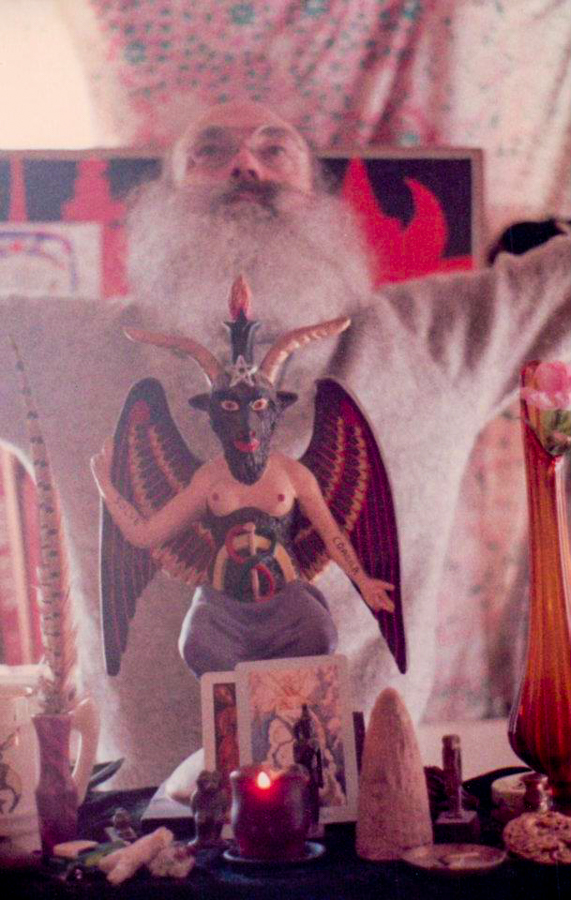

 Many years ago I was working with a certain teacher within the A∴A∴ who asked that I provide them a list of the ten books which most influenced my life… and this little gem made the list.
Many years ago I was working with a certain teacher within the A∴A∴ who asked that I provide them a list of the ten books which most influenced my life… and this little gem made the list.
For those of you who don’t know The Prophet was written by the Lebanese poet, artist, and philosopher Kahlil Gibran in 1923 and is now beloved around the world. Having now been translated in over 40 languages and selling millions of copies it is easily Gibran’s most celebrated work. It was made into an LP in 1974 narrated by Richard Harris and music provided by Arif Mardin. Today this can be heard on YouTube or purchased on CD. Though I have not heard this rendition reviews are generally positive. In 2015 it was adopted to film and appeared as a full length animated feature. The film received mixed reviews from fans and critics alike with most having some appreciation for Gibran’s work and the outstanding animation – while others complained that the film unnecessarily departed from the original story line.
In any regard this simple little book – which is an easy days read – has had a profound affect on me and over the years. Having now gifted it many times to friends, lovers and associates – I continue to revisit its wisdom. My personal copy is full of notes in relation to the truths spoken of there when reflecting upon my own path and understanding of Thelema as the beauty of Gibran’s words are only matched by the truths revealed therein. Speaking of Gibran, Claude Bragdon, the famous American author and architect once wrote “His power came from some great reservoir of spiritual life else it could not have been so universal and so potent, but the majesty and beauty of the language with which he clothed it were all his own.” And I couldn’t agree more – those of you who have not read this book or do not own a copy a highly recommend you track one down. Being that it is constantly in print makes it readily available and used copies are quite affordable.
Over the last several weeks this book has come up several times on social media and also a few private conversations and I’ve noticed that many of my fellow Thelemite’s share my appreciation of this work. Yet what few would know is that Grady McMurtry also had a special place in his heart for this wonderful little book.
A few months back while shuffling thru Grady’s private papers I came across a list of quotes he had made from The Prophet. It’s essentially a list of his favorite line(s) from most chapters. At times Grady records just a single line, at others a few (& not always in order). In all Gibran writes on 26 topics and of these Grady chooses a line or more from all but Eight (and a few from “The Farewell”). These eight are on Giving, Work, Freedom, Teaching, Friendship, Talking, Time and Good and Evil. There is no indication as to why he didn’t select any lines from these chapters but I do find it interesting to consider the lines he did and did not select. Of all the lines of wisdom contained herein these are Grady’s choices… and so give us some insight into the Man that would be our Caliph.
What now follows (and published for the first time) is the complete list of lines as found amongst Grady’s papers… I hope you will find them as enjoyable as I have.
ON Love – Love has no other desire but to fulfill itself.
ON Marriage – You were born together, and together you shall be forevermore. But let there be spaces in your togetherness, and let the winds of the heavens dance between you. Even as the strings of a lute are alone though they quiver with the same music.
ON Children – Your children are not your children.
They are the sons and daughters of Life’s longing for itself.
They come through you but not from you,
And though they are with you yet they belong not to you.
You are the bows from which your children
as living arrows are sent forth.
The archer sees the mark upon the path of the infinite,
and He bends you with His might
that His arrows may go swift and far.
Let your bending in the archer’s hand be for gladness;
For even as He loves the arrow that flies,
so He loves also the bow that is stable.
ON Eating and Drinking – When you kill a beast say to him in your heart,
By the same power that slays you, I too am slain; and I too shall be consumed.
For the law that delivered you into my hand shall deliver me into a mightier hand.
Your blood and my blood is naught but the sap that feeds the tree of heaven.
ON Joy and Sorrow – Your joy is your sorrow unmasked.
And the selfsame well from which your laughter rises was oftentimes filled with your tears.
ON Houses – Your house shall be not an anchor but a mast. You shall not dwell in tombs made by the dead for the living. For that which is boundless in you abides in the mansion of the sky, whose door is the morning mist, and whose windows are the songs and the silences of night.
ON Clothes – Your clothes conceal much of your beauty, yet they hide not the unbeautiful.
And though you seek in garments the freedom of privacy you may find in them a harness and a chain.
Would that you could meet the sun and the wind with more of your skin and less of your raiment,
For the breath of life is in the sunlight and the hand of life is in the wind.
Some of you say, “It is the north wind who has woven the clothes we wear.”
And I say, Ay, it was the north wind,
But shame was his loom, and the softening of the sinews was his thread.
And when his work was done he laughed in the forest.
Forget not that modesty is for a shield against the eye of the unclean.
And when the unclean shall be no more, what were modesty but a fetter and a fouling of the mind?
And forget not that the earth delights to feel your bare feet and the winds long to play with your hair.
ON Buying and Selling – And if there come the singers and the dancers and the flute players, buy of their gifts also.
For they too are gatherers of fruit and frankincense, and that which they bring, though fashioned of dreams, is raiment and food for your soul.
ON Crime and Punishment – It is when your spirit goes wandering upon the wind,
That you, alone and unguarded, commit a wrong unto others and therefore unto yourself.
And for that wrong committed must you knock and wait a while unheeded at the gate of the blessed.
Like the ocean is your god-self;
It remains for ever undefiled.
And like the ether it lifts but the winged. Even like the sun is your god-self;
It knows not the ways of the mole nor seeks it the holes of the serpent.
But your god-self dwells not alone in your being.
Much in you is still man, and much in you is not yet man,
But a shapeless pigmy that walks asleep in the mist searching for its own awakening.
And of the man in you would I now speak.
For it is he and not your god-self nor the pigmy in the mist, that knows crime and the punishment of crime.
You cannot separate the just from the unjust and the good from the wicked;
For they stand together before the face of the sun even as the black thread and the white are woven together.
And when the black thread breaks, the weaver shall look into the whole cloth, and he shall examine the loom also.
ON Laws – You delight in laying down laws,
Yet you delight more in breaking them.
Like children playing by the ocean who build sand-towers with constancy and then destroy them with laughter.
But while you build your sand-towers the ocean brings more sand to the shore,
And when you destroy them the ocean laughs with you.
Verily the ocean laughs always with the innocent.
But what of those to whom life is not an ocean, and man-made laws are not sand towers,
But to whom life is a rock, and the law a chisel with which they would carve it in their own likeness?
They see only their shadows, and their shadows are their laws.
And what is the sun to them but a caster of shadows?
And what is it to acknowledge the laws but to stoop down and trace their shadows upon the earth?
But you who walk facing the sun, what images drawn on the earth can hold you?
ON Reason and Passion – Your reason and your passion are the rudder and the sails of your seafaring soul. If either your sails or your rudder be broken, you can but toss and drift, or else be held at a standstill in mid-seas. For reason, ruling alone, is a force confining; and passion, unattended, is a flame that burns to its own destruction.
Therefore let your soul exalt your reason to the height of passion, that it may sing; And let it direct your passion with reason, that your passion may live through its own daily resurrection, and like the phoenix rise above its own ashes.
ON Pain – Your pain is the breaking of the shell that encloses your understanding.
ON Self Knowledge – Say not, “I have found the truth,” but rather, “I have found a truth.”
Say not, “I have found the path of the soul.” Say rather, “I have met the soul walking upon my path.”
For the soul walks upon all paths.
The soul walks not upon a line, neither does it grow like a reed.
The soul unfolds itself like a lotus of countless petals.
ON Prayer – You pray in your distress and in your need; would that you might pray also in the fullness of your joy and in your days of abundance.
For what is prayer but the expansion of yourself into the living ether?
And if it is for your comfort to pour your darkness into space, it is also for your delight to pour forth the dawning of your heart.
ON Pleasure – …your body is the harp of your soul.
ON Beauty – Where shall you seek beauty, and how shall you find her unless she herself be your way and your guide?
And how shall you speak of her except she be the weaver of your speech?
beauty is not a need but an ecstasy.
It is not a mouth thirsting nor an empty hand stretched forth,
But rather a heart enflamed and a soul enchanted.
People of Orphalese, beauty is life when life unveils her holy face.
But you are life and you are the veil.
Beauty is eternity gazing at itself in a mirror.
But you are eternity and you are the mirror.
ON Religion – He who wears his morality but as his best garment were better naked.
The wind and the sun will tear no holes in his skin.
And he who defines his conduct by ethics imprisons his song-bird in a cage.
The freest song comes not through bars and wires.
And he to whom worshiping is a window, to open but also to shut, has not yet visited the house of his soul whose windows are from dawn to dawn.
ON Death – If you would indeed behold the spirit of death, open your heart wide unto the body of life.
For life and death are one, even as the river and the sea are one.
For what is it to die but to stand naked in the wind and to melt into the sun?
And what is it to cease breathing, but to free the breath from its restless tides, that it may rise and expand and seek God unencumbered?
The Farewell – There are no graves here. These mountains and plains are a cradle and a stepping stone. A little while, and my longing shall gather dust and foam for another body. A little while, a moment of rest upon the wind, and another woman shall bear me.
(Almustafa, the chosen and the beloved. Almirtra, the priestess)

